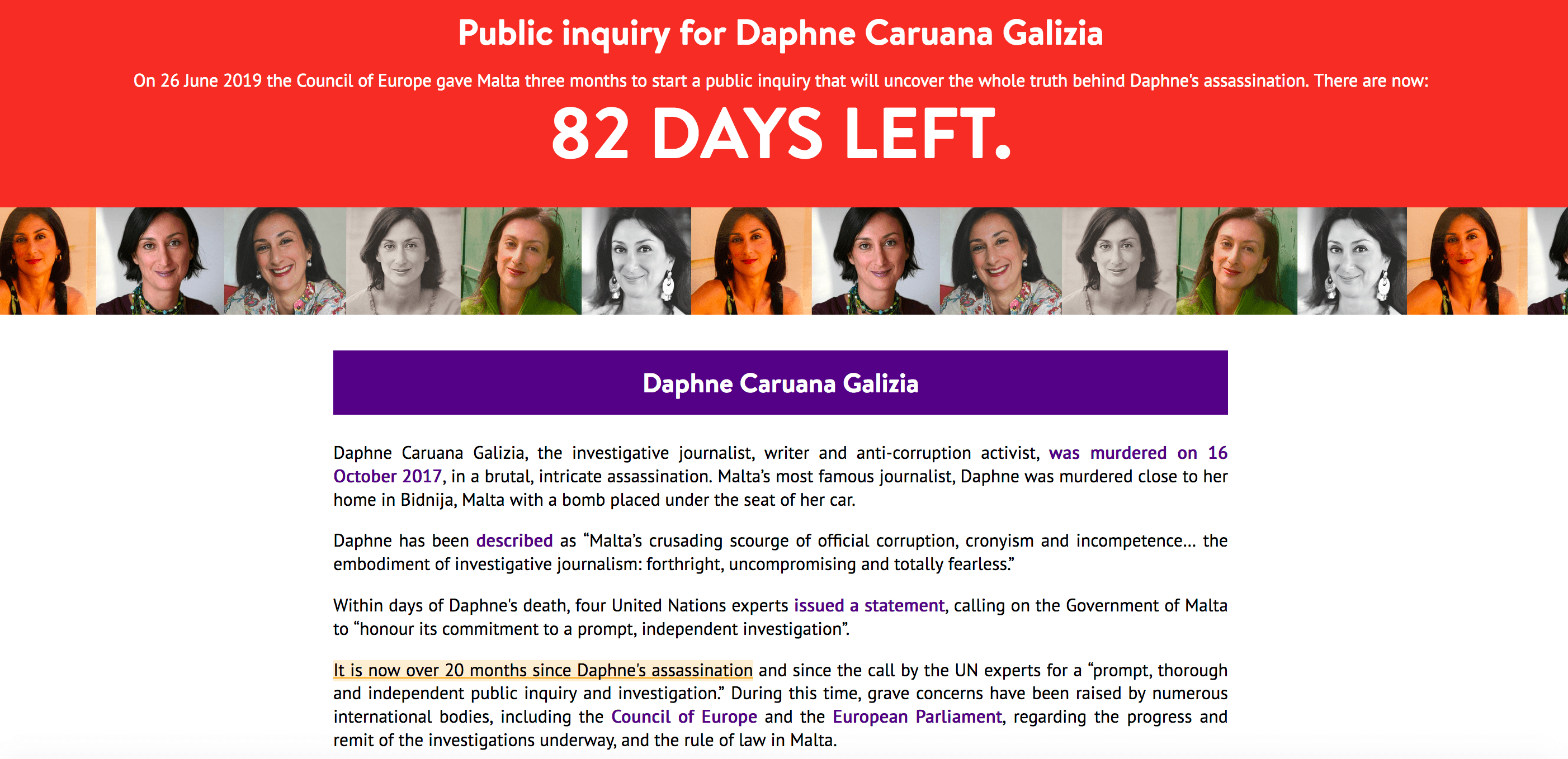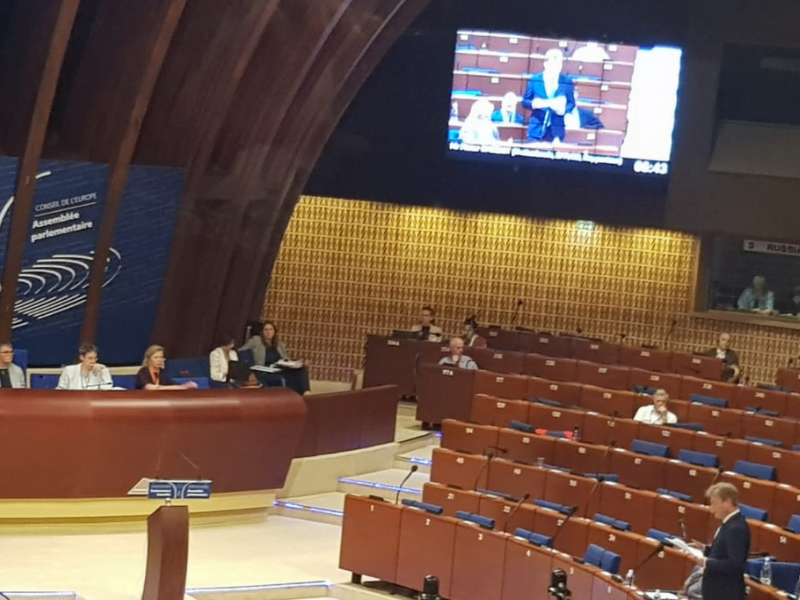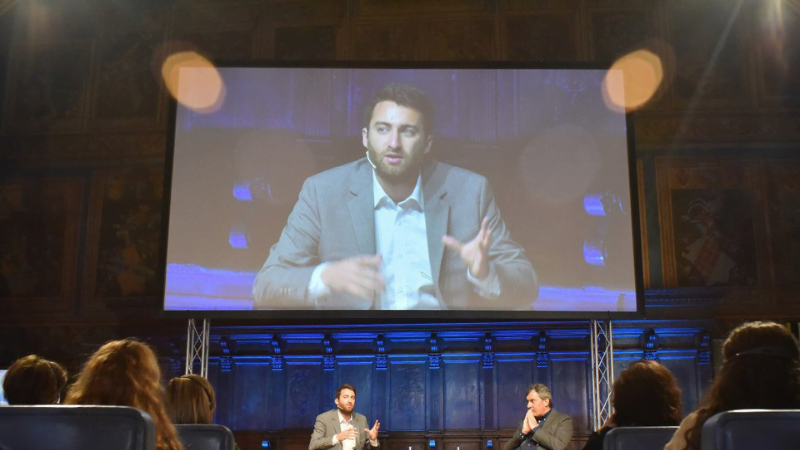An online tracker of the three-month deadline set for the launch of an independent public inquiry into the assassination of journalist Daphne Caruana Galizia was launched by the foundation on Thursday.
The deadline was set in the report by the Parliamentary Assembly of the Council of Europe (PACE), authored by Special Rapporteur Pieter Omtzigt and adopted last week.
The online tracker reminds the government the time has come to do its job, Matthew Caruana Galizia told The Shift News. “The public inquiry isn’t only about justice for our mother. It’s the only way for Malta to learn how to prevent the murder of other investigative journalists and campaigners”.
“We want to make sure no journalist is murdered for doing their job, ever again, and that Malta creates an environment that’s conducive to free, critical journalism,” said the journalist’s son, who directs the family’s foundation.
The online tracker counts down the days left to the the three-month deadline. The Maltese government representatives sought to water down this demand in the list of amendments it presented on the PACE report. This was rejected.

“It’s important that people know that the Prime Minister is dragging this out for as long as he can, so that’s why we have the timer. There’s a lot of disinformation being spread about the investigation. This is why we go over the reasons for the public inquiry and explain how it’ll work,” Caruana Galizia said.
The family is calling on the government to recognise its human rights obligations, saying “grave concerns have been raised by numerous international bodies, including the Council of Europe and the European Parliament, regarding the progress and remit of the investigations underway, and the rule of law in Malta.”
A UN statement released in the days following the journalist’s assassination in October 2017 called for Malta to “honour its commitment to a prompt, thorough independent public inquiry and investigation.”
‘This is your job, now do it’
It is now almost two years since Caruana Galizia’s assassination on 16 October 2017. The Maltese authorities initiated criminal proceedings against the men who allegedly detonated the bomb that killed Caruana Galizia and a parallel magisterial inquiry into whether others should be charged with criminal offences for commissioning the alleged assassins.
The compilation of evidence against the three suspects arrested has still not resulted in a trial. They will be released on bail in a month if there is no indictment until then.
The family has long stressed the need for an independent public inquiry, based on international human rights law, separate to any ongoing investigations.
“Both the criminal proceedings and magisterial inquiry focus solely on criminal culpability. However, neither process is investigating the wider and even more serious question as to whether the Maltese State is responsible for the circumstances that led to Daphne’s death.”
According to human rights law, independent public inquiries are important as the future deaths of journalists can only be prevented if the governments involved recognise their legal obligations and State responsibilities to ensure the right to life, and an independent and effective investigation into suspicious deaths.

Special Rapporteur Pieter Omtzigt presenting his report on Malta during the plenary debate at PACE last week.
The European Parliament also passed a resolution in March that called on EU Member States and institutions to “initiate an international independent public inquiry into the murder of the late journalist and the alleged cases of corruption, financial crimes, money laundering, fraud and tax evasion reported by Caruana Galizia, which involve high ranking current and former public officials of Malta.”
Together with the Council of Europe and Member State governments, there are also 25 international press freedom and freedom of expression organisations, including the International Federation of Journalists, that have formally written to the Prime Minister to urge him to abide by the country’s legal obligations under human rights law and set up an independent public inquiry.
“Protecting the lives and voices of journalists in Malta and across Europe depends upon this public inquiry,” the formal request sent in October 2018 stated.
Caruana Galizia said he was concerned the Maltese government had forgotten the reason for its own existence.
“It isn’t there to enrich and protect arrogant and corrupt people, no matter how many crimes or failures they’re responsible for. It’s there to help us live freer, better, more humane lives, that our rights are respected and that the lives of the people who sacrifice the most for our democracy are protected,” he said.
“Our website reminds the government of this fundamental purpose. You could reduce it to this: ‘This is your job, now do it’.”













